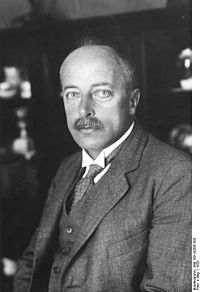Max von Laue
Scientist
Max Theodor Felix von Laue (9 October 1879 – 24 April 1960) was a German physicist who won the Nobel Prize in Physics in 1914 for his discovery of the diffraction of X-rays by crystals. In addition to his scientific endeavors with contributions in optics, crystallography, quantum theory, superconductivity, and the theory of relativity, he had a number of administrative positions which advanced and guided German scientific research and development during four decades. A strong objector to National Socialism, he was instrumental in re-establishing and organizing German science after World War II.
Personal facts
| Alias (AKA) | Laue Max Theodore Felix von |
|---|
| Birth date | October 09, 1879 |
|---|
| Birth name | Max Theodor Felix von Laue |
|---|
| Birth place | German Empire , Germany , Koblenz , Kingdom of Prussia , Pfaffendorf |
|---|
| Nationality | |
|---|
| Date of death | April 24, 1960 |
|---|
| Place of death | |
|---|
| Education | Humboldt University of Berlin Ludwig Maximilian University of Munich |
|---|
| Known for | |
|---|
